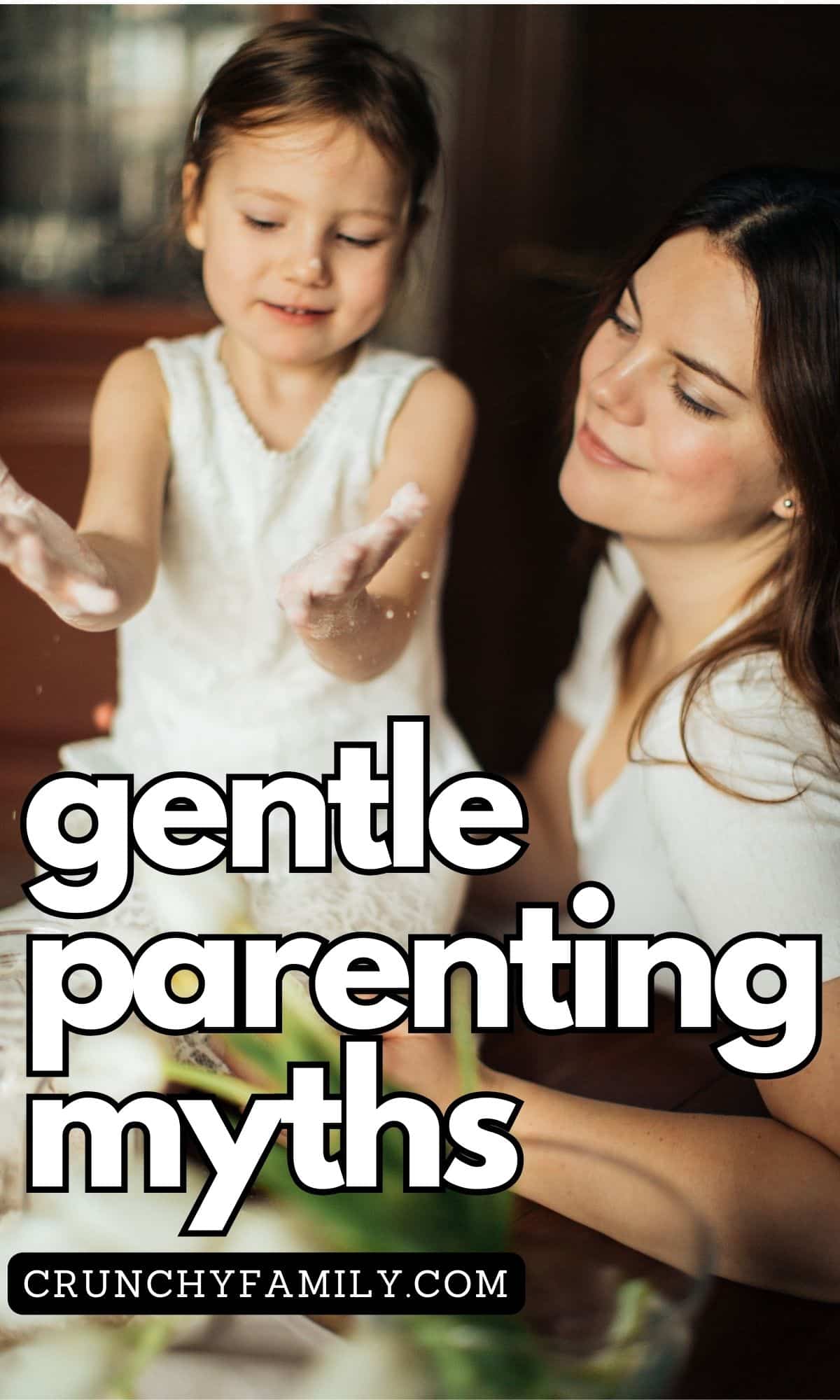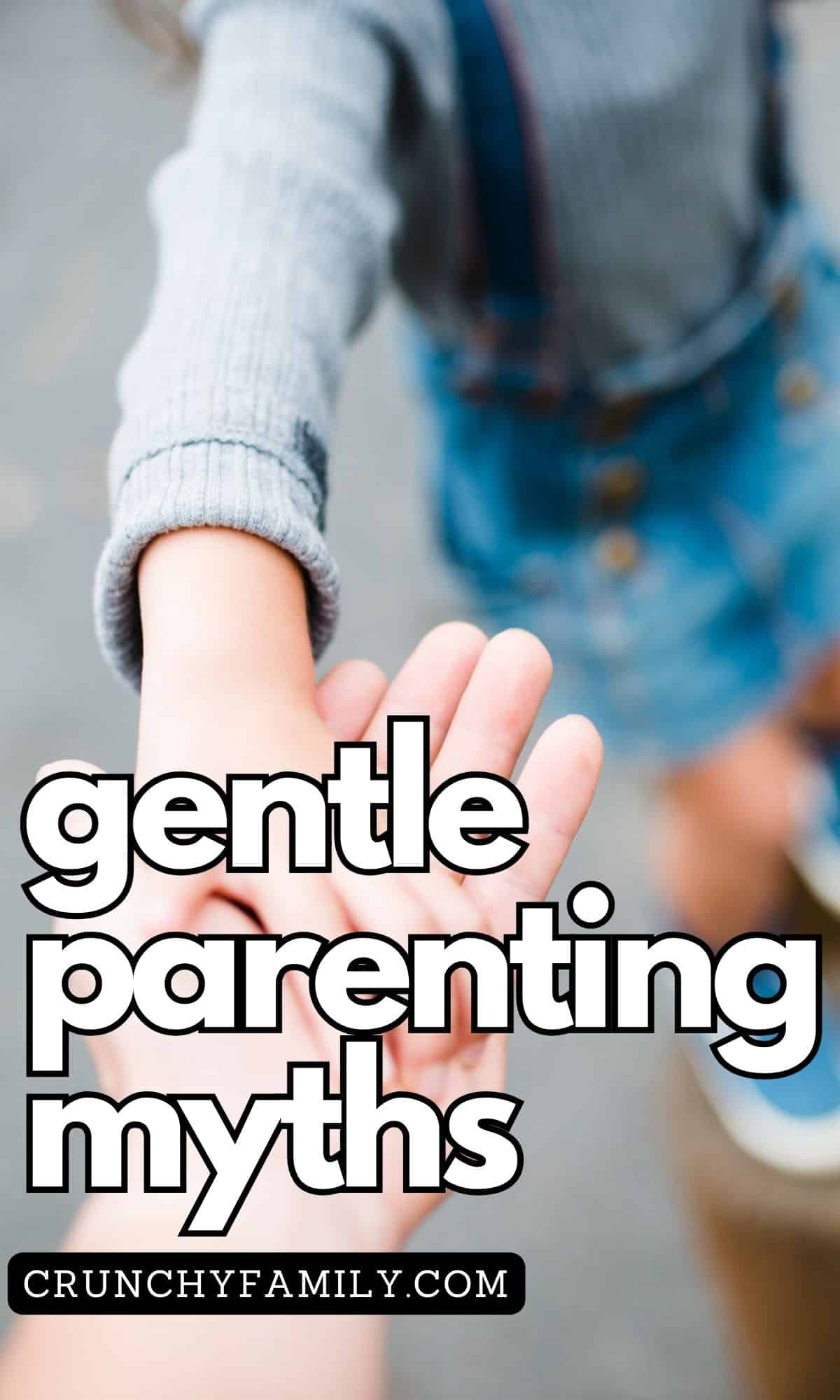Gentle Parenting is Often Misunderstood. So let’s Separate fact from fiction, and debunk some of the most commonly heard gentle parenting myths with clear explanations to help break down some of the negative hype, and understand the benefit that gentle parenting can really bring to our communities.

What Exactly is Gentle Parenting?
Gentle parenting is all about guiding kids with a loving and connected approach. It’s about setting boundaries and instilling values without the need for punishment or harsh discipline. The goal is to raise children who are empathetic, responsible, and self-disciplined—all through understanding and support.
You can read more in depth on our posts about gentle discipline and other names for gentle parenting to get more background on what exactly gentle parenting is.
Related: What is Gentle Parenting and Why Practice It with Your Kids?
Myth #1: Gentle Parenting Means No Discipline or Boundaries
Fact: Gentle Parents Have Rules and Boundaries, Just Enforced Through Connection and Guidance Rather Than Punishment.

When we talk about boundaries in gentle parenting, what we’re really focusing on is teaching kids to understand the ‘why’ behind the rules. Instead of simply saying “because I said so,” gentle parents explain the reasons, helping children internalize the importance of these boundaries themselves.
This method helps build trust and respect between parent and child, making the rules something kids want to follow, not just feel forced to obey.
Gentle Parenting is Permissive Parenting
Reality: Nope, not the same thing. Gentle parenting isn’t about letting kids run wild; it’s about setting clear limits but doing so in a compassionate way. The focus is on guiding rather than punishing.
Gentle Parents Let Kids Do Whatever They Want
Truth: Actually, gentle parents set the bar high. They expect a lot from their kids but are also ready to listen and adapt. They enforce rules with empathy, making sure the kids understand why those rules exist.
Gentle parenting does not at all mean that you hand your toddler all of the control, with zero guidance.
Myth #2: Gentle Parenting Will Spoil Children
Reality: Gentle Parenting Teaches Responsibility and Instills Inner Discipline Over Time.
One of the key aspects of gentle parenting is fostering independence and accountability in a supportive environment.
By encouraging kids to make choices and solve problems on their own, with guidance as needed, children learn to take responsibility for their actions early on.
This approach not only prevents entitlement but also empowers children to handle challenges and setbacks with resilience, understanding that mistakes are opportunities to learn and grow.

Gentle Parenting Produces Entitled, Bratty Kids
Fact: It’s quite the opposite. This approach is grounded in teaching kids about empathy, cooperation, and respect.
Gentle parenting helps children learn to value others and build strong, positive relationships.
Related: 10 Powerful Reasons Why Kids Need Role Models
Children Need More Discipline to Become Responsible
Truth: Harsh discipline can actually be counterproductive, leading to rebellion and resentment. Gentle parenting aims to develop a child’s inner discipline, which is a more durable and effective form of self-control.
Myth #3: Gentle Parenting Only Works for Certain Kids
Fact: Gentle Parenting is a Mindset That Can Work for Any Family.
Gentle parenting is adaptable, which is why it works across different temperaments and personalities. It’s not a one-size-fits-all but rather a flexible set of principles that can be tailored to meet the unique needs of each child.
For instance, a strong-willed child might need more choices to feel in control, whereas a more reserved child might need gentle encouragement to express their needs or take risks.
Understanding and adapting to these differences is key in making gentle parenting effective for everyone.

Gentle Parenting Works Better for Girls Than Boys
Reality: There’s no gender limit on who can benefit from gentle parenting. It’s all about adjusting the approach based on what each child needs, regardless of gender.
Gentle Parenting Won’t Work for Strong-Willed Kids
Truth: It might surprise you, but gentle parenting is especially effective for spirited or strong-willed kids. It meets their need for independence while still guiding them towards good behavior and cooperation.
While there are many misconceptions, gentle parenting is really about nurturing a child’s ability to be kind, responsible, and wise.
It’s not an “easy” approach—it requires a lot of patience and flexibility.
The myths often stem from misunderstandings about what gentle parenting actually entails. By focusing on connection and understanding, gentle parenting paves the way for kids to develop into well-rounded adults.

Gentle parenting is deeply rooted in the emotional well-being of children, setting them up for success in life with a solid foundation of understanding and self-discipline. It’s a belief system that sees the long-term development of a child, beyond immediate compliance.
By fostering this type of a parenting environment, we not only believe in the potential of our children but also equip them with the tools to navigate the complexities of life with confidence and empathy.

What other gentle parenting myths have you heard?
1 thought on “Common Gentle Parenting Myths”